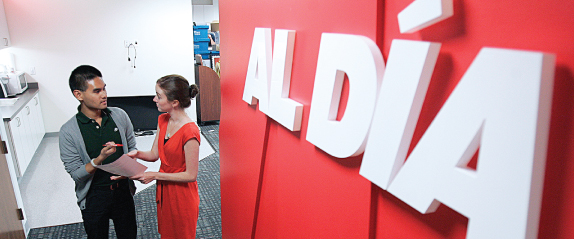
What does 'AL DÍA' mean? Easy: 'Let's get on with it!'
MÁS EN ESTA SECCIÓN
The name always catches people thinking: "what in God's name that could that name mean?"
"What is AL DIA?" the bravest sometimes dare to ask.
And we, Latinos, always willing to teach the ABCs of a language we feel so proud of commanding, start by breaking the expression down in two pieces and literally translating each.
First of all, "Día" means "day," we explain.
And "Al", next to "Día," in our unpredictable Spanish language, triggers instantly a new meaning, rather irrational, but accepted as an idiomatic expression that means, to put it simply, "up to date."
In a more relevant context for our news media business, we take it one step further to use the name "AL DÍA."
We say, "¡Ponte AL DÍA!" in Spanish, to convey the most emotional aspect of journalism: To be "on top of what is going on," to know first; to scoop, never to be scooped.
We would translate the cheery "¡Ponte AL DÍA!" into English as follows:
"Let's get on with it!"
"To be AL DÍA," and/or "get on with it" means, as those expressions imply, a lot to us.
It is actually the core of our work, in an American community that sees almost no edifying reflection of itself in mass media, only if associated with negative or futile images: "Latino" means anything from people who wear "Mexican Sombreros" during Hispanic Heritage Month or "Cinco de Mayo," to those dehumanized "illegal aliens," as the AP used to brand them until not too long ago.
In reality they are fellow residents of our cities who, thanks to the constant repetition by those creators of meaning in our society, are forced to live in the shadows, in constant fear of arrest and subsequent deportation, or, in the case of our young, born in this country, uncertain whether or not they should identify themselves as "Latinos" because of the shadow still projecting itself over the label.
"To get on with it" acquires, therefore, a meaning to the amazing group of reporters and editors who make AL DÍA possible every day, eventually every hour in our new news website (coming this June!), or every week in our print edition, which has circulated nonstop for the past 20 years.
"To get on with it" will mean the immediacy of the scoop on the web, to be the first to know it and possibly communicate it, although not anymore on that confirmed Five-Ws fact, or hard news piece, as we learned in now obsolete schools of journalism.
All because the disruptive technology, or "Google News," or sometimes simple bloggers, beat every reporter on earth in that regard every minute of the day.
On the contrary, what will be the scoop to us is what Tina Brown calls the "interpretative scoop."
In our case, colored by the very fact that Latinos are not priority on anybody's agenda in any major newsroom in America.
We don't take offense at it anymore; on the contrary, we take as our unfulfilled, rather personal responsibility.
As far as AL DÍA is concerned, that is our main editorial agenda:
To cover that growing segment of our society that keeps on expanding numerically, while in the opposite direction, in the society at large, grows a lack of understanding, or plain misunderstanding, of who these fellow Americans of Latino heritage in reality are.
That is "our scoop," on the web, or in print, or in our newsy public events, with audiences that (you have to come yourself and experience this!) are the most diverse in our city.
All we attempt to do is to pull the curtain, to show what has been in the shadows for too long. Or perhaps simply set the record straight.
Or, to make it easy to remember, to use my favorite expression in the courageous English language, always ready with a punch line:
"Let's Get On with It!"






DEJE UN COMENTARIO:
¡Únete a la discusión! Deja un comentario.